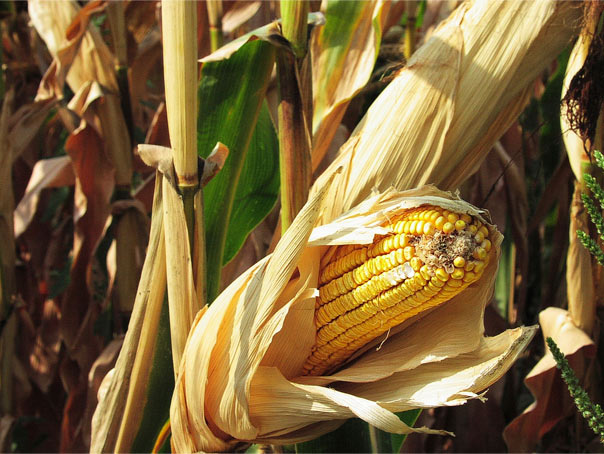
To access all the articles in this month's issue of The Organic & Non-GMO Report, SUBSCRIBE NOW.
Vermont corn trials highlight better non-GMO yields, crop rotations over GMOs
By Ken Roseboro
Published: May 28, 2015
Category: Non-GMO Plant Breeding
Non-GMO short-and long-season varieties finish in top 10 in terms of yields and quality; diversified rotation, not GM trait, has greater impact on yield and soil health
University of Vermont (UVM) field trials of short- and long-season corn found that non-GMO seed varieties performed as well as or even better than some genetically modified varieties. A cropping system trial found that corn grown in a diversified crop rotation produced higher yields and better soil quality than corn grown continuously year after year.
Trials conducted to evaluate corn varieties
The UVM Extension Northwest Crops and Soils Team evaluated yield and quality of both short- and long-season corn silage seed varieties and the impact of corn cropping systems on the overall health and productivity of the crop and soil. The trials were conducted at the Borderview Research Farm in Alburgh, VT.
Short-season corn, which matures in 77-95 days, is grown in Vermont’s cooler climate, which has fewer growing days. By growing a short-season corn variety, farmers have more time in the fall to prepare their soil for winter by applying manure and planting cover crops. This helps minimize nutrient and soil losses.
Long-season corn, which matures in 95-112 days, can be difficult to grow in Vermont’s cooler climate with its fewer growing days. However, on many farms, long season corn can produce higher yields and quality than many short season varieties.
The corn cropping system trial evaluated yield and soil health of five different corn rotations: continuous corn, no-till, corn planted after perennial forage, corn planted after a cover crop of winter rye, and a perennial forage fescue.
The UVM team was comprised of extension agronomist Dr. Heather Darby and extension crops and soils technicians Sara Ziegler, Erica Cummings, Susan Monahan, and Julian Post.
UVM, along with other major agricultural universities, conducts the trials as a service to farmers and seed companies, allowing them to have unbiased replicated data that evaluates seed varieties from a range of seed companies.
Seed companies adding non-GMO varieties
UVM’s trials included non-GMO corn varieties. According to Darby, there have been fewer non-GMO seed varieties in university trials in recent years, but that may be changing.
“Over the last few years farmers have been requesting non-GMO varieties, and companies are starting to add more to their lineups,” Darby said.
Of 29 corn varieties grown in the short-season trial, four were non-GMO and the rest were GMO. The non-GMO seeds were submitted by Prairie Hybrids, Seedway, and Albert Lea Seeds.
Of 45 varieties grown in the long-season trial, 13 were non-GMO and submitted by the same three companies. The GMO varieties were submitted by DeKalb, Mycogen, Pioneer Hi-Bred, T.A. Seeds, and Syngenta.
Non-GMO varieties performed in top 10 for yield and quality
In the short-season UVM trial, all four non-GMO corn varieties performed better than average in terms of yield, while three performed better than average in terms of both yield and quality.
In the long-season trial, seven of the non-GMO varieties performed better than average in terms of yield and quality.
“There were non-GMO varieties that performed in the top 10 for both the long- and short- season corn variety trials,” Darby said.
Darby sees a growing trend of including more non-GMO corn varieties in university field trials.
“I do think there is a trend, in the northeast anyway,” she said.
Corn-alfalfa rotation produces better soil quality and yields
The corn cropping system trial found that corn planted after perennial alfalfa performed best in terms of improved soil quality and yields, of all the corn rotations. Darby also said corn-alfalfa rotation also had no insect damage, while those in other rotations did.
A Roundup Ready GM corn was planted in all four of the crop rotations, yet Darby said the GM trait had no effect on yield.
“It goes to show that good rotation and soil management does far more for production and yields than GMO,” Darby said.
© Copyright The Organic & Non-GMO Report, June 2015




